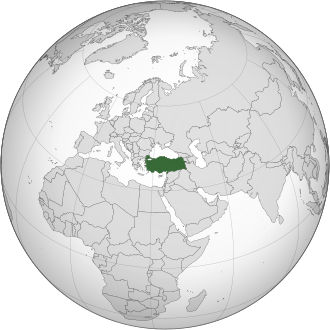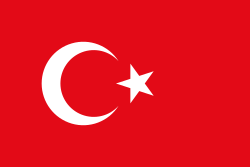
Back Ҭырқәтәыла Abkhazian Turuki ACE Тыркуе ADY Turkye Afrikaans Türkei ALS Türkiye ALT ቱርክ Amharic Turkey AMI Turquía AN Tyrcland ANG
Republic of Türkiye Türkiye Cumhuriyeti (Turkish) | |
|---|---|
| Anthem: İstiklal Marşı "Independence March"[1] | |
 | |
| Capital | Ankara 39°55′N 32°51′E / 39.917°N 32.850°E |
| Largest city | Istanbul 41°1′N 28°57′E / 41.017°N 28.950°E |
| Official languages | Turkish[2][3] |
| Spoken languages |
|
| Ethnic groups (2016)[5] |
|
| Demonym(s) |
|
| Government | Unitary presidential republic |
| Recep Tayyip Erdoğan | |
| Cevdet Yılmaz | |
| Numan Kurtulmuş | |
| Kadir Özkaya | |
| Legislature | Grand National Assembly |
| Establishment | |
| c. 1299 | |
| 19 May 1919 | |
| 23 April 1920 | |
| 1 November 1922 | |
| 24 July 1923 | |
| 29 October 1923 | |
| 9 November 1982[6] | |
| Area | |
• Total | 783,562 km2 (302,535 sq mi) (36th) |
• Water (%) | 2.03[7] |
| Population | |
• December 2024 estimate | |
• Density | 111.4[9]/km2 (288.5/sq mi) (83rd) |
| GDP (PPP) | 2024 estimate |
• Total | |
• Per capita | |
| GDP (nominal) | 2024 estimate |
• Total | |
• Per capita | |
| Gini (2021) | medium |
| HDI (2022) | very high · 45th |
| Currency | Turkish lira (₺) (TRY) |
| Time zone | UTC+3 (TRT) |
| Calling code | +90 |
| ISO 3166 code | TR |
| Internet TLD | .tr |
Turkey,[a] officially the Republic of Türkiye,[b] is a transcontinental country located mainly on the Anatolian Peninsula in Western Asia, with a small portion on the Balkan Peninsula in Southeast Europe. It shares borders with the Black Sea to the north; Georgia to the northeast; Armenia, Azerbaijan, and Iran to the east; Iraq to the southeast; Syria and the Mediterranean Sea to the south; the Aegean Sea to the west; and Greece and Bulgaria to the northwest. It also shares a maritime border with Cyprus to the south.
Turkey is a republic. There are 81 provinces in Turkey. The money of Turkey is called the Turkish Lira. The capital city is Ankara, a city in the central region, called Anatolia. The cultural and economic centre is in the European side of Istanbul. In the past Istanbul was called Constantinople. The republic was founded in 1923, after World War I and a war of independence (Kurtuluş Savaşı). Before that, Turkey was the core of the Ottoman Empire.
Many civilisations were in the area that is now Turkey, like the Hittites, the Roman Empire and the Byzantine Empire. Many important events in the history of Christianity happened in places that are now in Turkey. Because it lies in both Europe and Asia, some people see Turkey as the "door" between them. The vast majority of the Turkish population believes in the religion of Islam.
Modern Turkey's varied climate lets many kinds of food crops grow, and livestock and forestry are important industries. Turkey makes enough food to feed itself. Turkish manufactures include aeroplanes, electronics, cars, clothing and textiles for home and for other countries.
Turkey is a popular place for tourists to visit. It has hundreds of kilometres of beaches on its Aegean and Mediterranean coasts, and many important historical places.
- ↑ "The Turkish Flag and The Turkish National Anthem (Independence March)". Republic of Türkiye, Ministry of Foreign Affairs. Retrieved 4 August 2024.
- ↑ "Türkiye Cumhuriyeti Anayasası" (in Turkish). Grand National Assembly of Turkey. Archived from the original on 2 July 2020. Retrieved 1 July 2020.
3. Madde: Devletin Bütünlüğü, Resmi Dili, Bayrağı, Milli Marşı ve Başkenti: Türkiye Devleti, ülkesi ve milletiyle bölünmez bir bütündür. Dili Türkçedir. Bayrağı, şekli kanununda belirtilen, beyaz ay yıldızlı al bayraktır. Milli marşı "İstiklal Marşı" dır. Başkenti Ankara'dır.
- ↑ "Mevzuat: Anayasa" (in Turkish). Constitutional Court of Turkey. Archived from the original on 21 June 2020. Retrieved 1 July 2020.
- ↑
- KONDA 2006, p. 19
- Kornfilt 2018, p. 537
- ↑ "Turkey (Turkiye)". The World Factbook. Central Intelligence Agency. Retrieved 19 May 2024.
- ↑ Cite error: The named reference
Constitution2019was used but no text was provided for refs named (see the help page). - ↑ "Surface water and surface water change". Organisation for Economic Co-operation and Development (OECD). Archived from the original on 24 March 2021. Retrieved 11 October 2020.
- ↑ "The Results of Address Based Population Registration System, 2024". www.tuik.gov.tr. Turkish Statistical Institute. 6 February 2025. Retrieved 6 February 2025.
- ↑ "Table.3 – Population of province/district centers and towns/villages by province and sex and population density". www.tuik.gov.tr. Turkish Statistical Institute. 6 February 2025. Retrieved 6 February 2025.
- ↑ 10.0 10.1 10.2 10.3 "World Economic Outlook Database, October 2024 Edition. (Türkiye)". www.imf.org. International Monetary Fund. 22 October 2024. Retrieved 22 October 2024.
- ↑ "Gini index (World Bank estimate) – Turkey". World Bank. 2019. Archived from the original on 17 May 2019. Retrieved 15 November 2021.
- ↑ "Human Development Index (HDI)". United Nations Development Programme. Archived from the original on 10 June 2022. Retrieved 18 March 2024.
<ref group=lower-alpha> tags or {{efn}} templates on this page, but the references will not show without a {{reflist|group=lower-alpha}} template or {{notelist}} template (see the help page).
